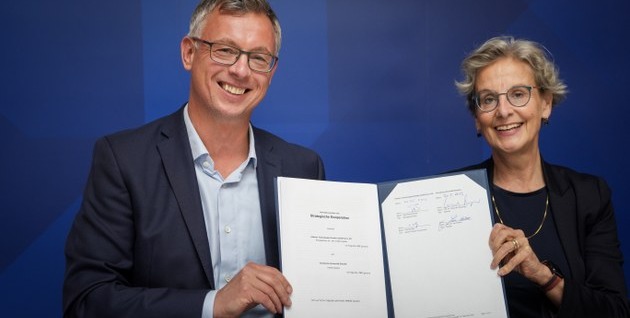With a strategic cooperation agreement, Infineon Technologies Dresden GmbH & Co. KG and the Technical University of Dresden (TUD) are expanding their long-standing cooperation even further.
Categories
With a strategic cooperation agreement, Infineon Technologies Dresden GmbH & Co. KG and the Technical University of Dresden (TUD) are expanding their long-standing cooperation even further.

Categories
Tags
Contact info
Silicon Saxony
Marketing, Kommunikation und Öffentlichkeitsarbeit
Manfred-von-Ardenne-Ring 20 F
Fax: +49 351 8925 889
Contact person:
With today’s ceremonial signing of the agreement by Raik Brettschneider, Vice President & Managing Director of Infineon Dresden, Thomas May, Senior Director Procurement of Infineon Dresden, Prof. Ursula M. Staudinger, Rector of TUD and Jan Gerken, Chancellor of TUD, the establishment of a long-term, trusting and comprehensive strategic partnership at eye level in the fields of research, teaching, innovation, further education, internationalization, recruiting and university marketing as well as in the social dialog on technology developments will be advanced. The close cooperation is intended to sustainably promote and strengthen the positions of both partners nationally and internationally.
“We see in the strengthening of our cooperation with Infineon the opportunity to further increase the visibility of nano- and microelectronic research and semiconductor manufacturing in the region for students and graduates nationally and internationally,” emphasizes the Rector of TUD, Prof. Ursula M. Staudinger. “As a research-strong excellence university with – as just confirmed again in current rankings – high innovative strength, we can give impulses for the next generation of semiconductors via the cooperation in the R&E area.”
“We have already been working very closely and very gladly with the TU Dresden for many years. With the strategic cooperation agreed today, we want to further expand this collaboration,” says Raik Brettschneider. “Global semiconductor demand will grow strongly and persistently in view of the high demand for renewable energies, data centers and electromobility. Microelectronics from Infineon make an important contribution to solving two key societal challenges: Decarbonization and Digitalization. With the construction of our new Smart Power Fab, the Dresden site has a key role to play. In the future, we want to work even more closely with the TU Dresden on projects for researching, developing and manufacturing innovative semiconductors. In this way, we are also strengthening the competitiveness of Europe’s largest microelectronics cluster, Silicon Saxony.”
Infineon has begun expanding production capacity at its Dresden site. The group is investing 5 billion euros in the “Smart Power Fab,” which will enable flexible production of two different semiconductor technologies: power electronics, to switch electricity with as little loss as possible, and analog/mixed-signal chips. Analog/mixed-signal components are used in power supply systems, such as energy-efficient chargers, small motor controllers for cars, data centers and applications in the Internet of Things. The interaction of power semiconductors and analog/mixed-signal components makes particularly energy-efficient and intelligent system solutions possible.
In detail, the strategic cooperation between Infineon Dresden and TUD foresees, for example, the implementation of bilateral research and development contracts as well as research and development cooperations. But cooperation will also be strengthened in the field of teaching, for example by expanding joint teaching formats. One proven format here is the “Dresden Microelectronics Academy” summer school, which has already been held several times at TUD, also with the support of Infineon Dresden.
“Equally important is the transfer of innovation and technology from the university to industry,” says Prof. Ronald Tetzlaff, Chief Officer Technology Transfer and Internationalization at TUD. “The cooperation is intended to enable close collaboration in research but also in teaching. When science and business work together successfully, a win-win situation is created on both sides. Scientific findings thus find their way more quickly directly into the economy and thus into application. In addition, students benefit from practical knowledge.”
The cooperation agreement, which is initially set to run for five years, also covers the topics of recruiting and university marketing, as well as the social dialog on technology developments that is to be shaped jointly. Here, for example, the focus is on current developments with regard to artificial intelligence – with its technical, but also ethical aspects.
Infineon Technologies Dresden GmbH & Co. KG is a subsidiary of Infineon Technologies AG and, with around 3,300 employees, one of the group’s largest development and production sites. Infineon is a leading global supplier of semiconductor solutions for power systems and the Internet of Things (IoT). With its products and solutions, Infineon is driving decarbonization and digitalization. The company has around 56,200 employees worldwide and generated revenues of around €14.2 billion in the 2022 fiscal year (ending September).
As a university of excellence, Dresden University of Technology (TUD) is one of Germany’s most powerful research institutions. With around 8,300 employees and more than 30,000 students, it is one of Europe’s major research and teaching institutions in the natural sciences and engineering. Founded in 1828, today it is a globally oriented, regionally anchored top university that aims to make innovative contributions to solving global challenges. In research and teaching, it combines engineering and natural sciences with the humanities, social sciences and medicine. This nationally outstanding diversity of subjects enables the university to promote interdisciplinarity and bring science to society.